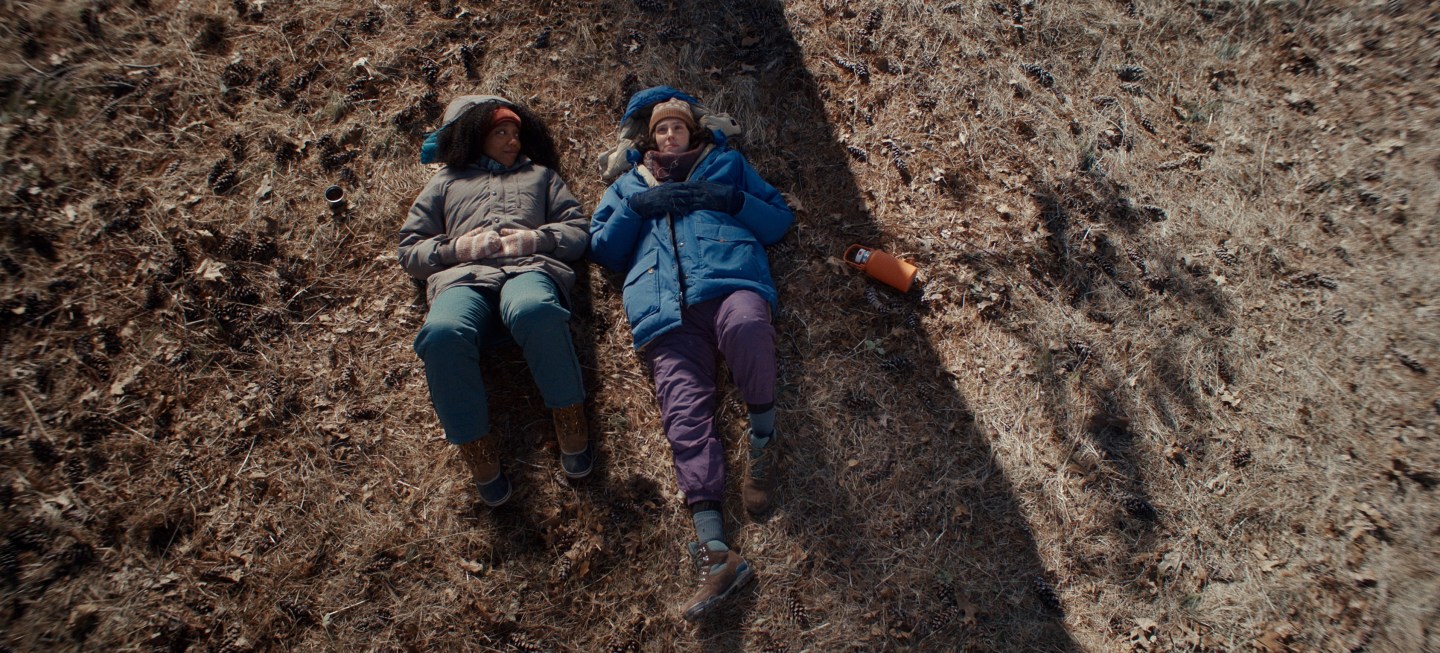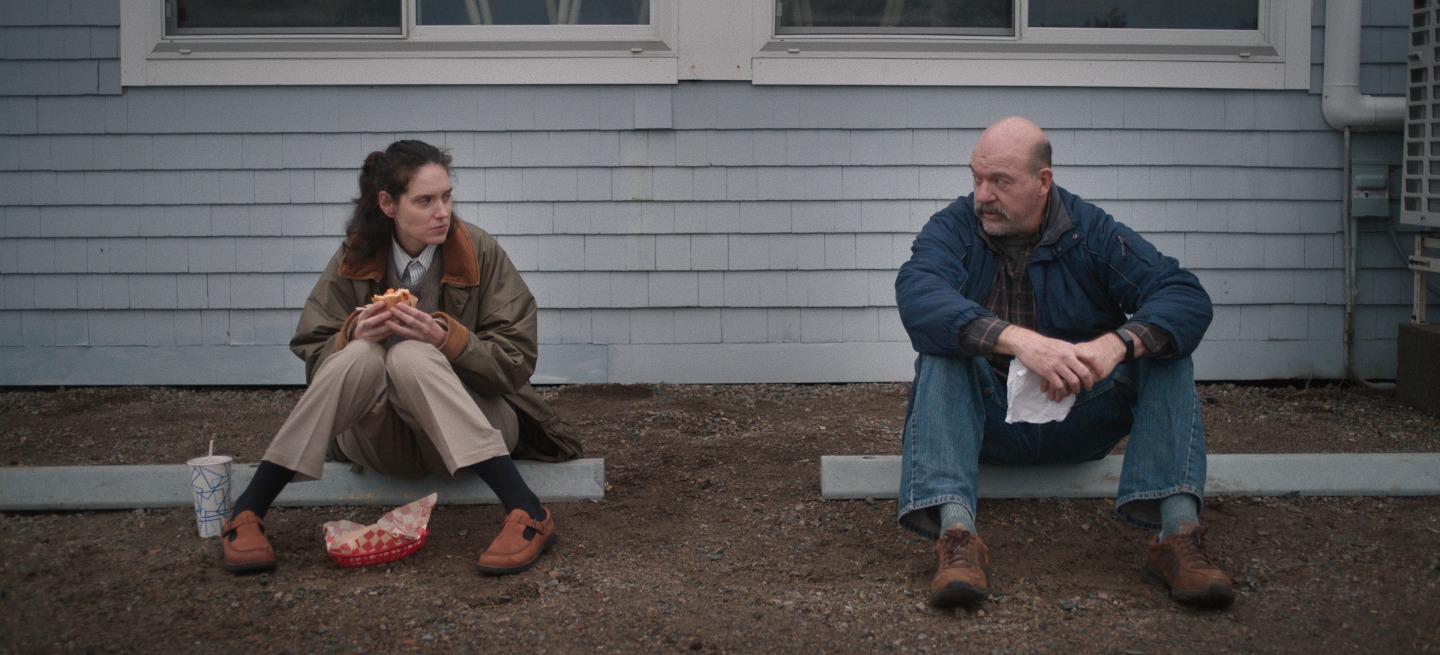Sorry, Baby refreshed the trauma movie playbook”>
Image from Sorry, Baby. (L-R) Eva Victor, John Carroll Lynch. Image courtesy of A24.
One of the most memorable scenes from Sorry, Baby, a nuanced and wryly funny new film about life after a harrowing incident, stems from a simple confession. “Something pretty bad happened to me,” divulges Agnes, played by comedian Eva Victor, to a kindly passerby who helps her during a panic attack. While “the bad thing” is referenced throughout the movie, the details are only revealed in the third act. Instead, Sorry, Baby is more about the unknowing, the kind of movie that slowly creeps up on you until it’s all you can think about.
A character hiding a secret ordeal that isn’t revealed until the end is a trope that runs across film, TV, and literature, but Victor refreshes the playbook through a mix of humor, tone, and structure to create something expertly balanced and true to life. Speaking from a press junket in New York City alongside co-stars Naomi Ackie (Mickey 17) and Lucas Hedges (Manchester by the Sea, Lady Bird), Victor says it couldn’t have been told in any other way: “I wrote it like a letter you write in therapy for yourself but never send.”
Victor is perhaps best known for their front-facing camera clips that dropped online during the pandemic, adding absurdity to subjects like “ladies who love to brag” and the concept of a straight Pride march. While the algorithm demands viral comics to double down on what works until they hit a creative dead end, Victor put their phone away and began writing the script for Sorry, Baby, which they also directed. After getting encouragement from Moonlight director Barry Jenkins (Victor DM’d Jenkins on a whim) and help from I Saw The TV Glow’s Jane Schoenbrun, Victor debuted Sorry, Baby to rave reviews at Sundance 2025. A24 bought it in a fierce bidding war — and it’s already being whispered about as a possible 2025 Oscar contender.
The movie is broken up into non-chronological chapters and paints Agnes as a fully-rounded individual: a young academic, a mom to a cat named Olga, and friend to Lydie (Ackie) and neighbor Gavin (Hedges). Life continues after the Bad Thing and Sorry, Baby moves at its own unique pace.
Ahead, Victor, Ackie, and Hedges spoke to The FADER about becoming friends on set, when a movie finds its own pulse, and how Instagram is its own form of film school.
The FADER: Eva, Naomi, the friendship between Agnes and Lydie feels so real and lived-in. Were you friends prior to production? If not, what were your first impressions of one another?
Eva Victor: We met to talk about the role and then we read together. That’s how we met. Then she came to set and we just got along really well. It was really easy. She is such a joy to be around.
Naomi Ackie: I feel the same way. I think the magic of their friendship on screen is because we naturally felt like we didn’t have to push too hard. Like, if I bumped into you, we’d be like, “Oh, cool. You’re just a cool girl.’ She was always singing [starts singing Beyoncé, “This Ain’t Texas.”]
Victor: God, that was so long ago, but I seriously respect myself for being a different age at one point. I’d vibe with you on set, at a party, in a café.” The job was to just translate that onto camera.
Lucas, what was it about your character Gavin that stood out in the script and made you want to take the role?
Lucas Hedges: When I read something I’m always looking for a feeling that I’m the one to do it. Sometimes I get asked to do things I’m not the one for. But with this, I just felt like the script had my name on it. You know that feeling when you read something and it’s like, “This is mine?” It was basically watermarked.
I could feel the character’s heartbeat in the dialogue. I could feel him trying to find the words, muscling something out. Within that struggle, there was a natural rhythm, but also that human [feeling of…] trying to figure things out. It was both natural and forced, like real-life dialogue.
 Sorry, Baby refreshed the trauma movie playbook”>
Sorry, Baby refreshed the trauma movie playbook”>
Image from Sorry, Baby. (L-R) Naomi Ackie, Eva Victor. Courtesy of A24.
Eva, Sorry, Baby is also your directorial debut. Do you feel you’ve now got the bug and want to keep going down this path — writing, acting, directing?
Victor: I really fell in love with the making of a film through this. The further I am from it, the more I crave that creative process. I think it spoiled me a bit because I got to make something in a very uncompromised way, telling a story I really cared about. Looking forward, I’m searching for that feeling in my stomach — the “I have to do this” feeling — whatever the medium.
I feel that the director’s job is special because you’re there the whole time while people come and go. You start alone in a room writing, then expand the project with more people. The thing you create becomes everyone’s film. Then, once you wrap, you go into a room with genius people in the dark trying to piece everything together. It’s insane but beautiful.
Ackie: Eva, I have a question. Did you ever get bored of the story?
Victor: I didn’t get bored of the film, but I did get frustrated with it during editing. I experienced what I can only describe as ego death. I dyed my hair and eyebrows then pierced my belly button, which got infected. It was a very emotional time.
The cool thing is when the film starts having its own pulse. It begins telling you what it needs and rejects scenes you thought were essential. That scene I thought was the reason the movie got made? Doesn’t work in the film. It’s crazy.
Barry Jenkins came on board after seeing the videos you posted online. Did you have any idea at that time that what you were doing could translate into a bigger narrative or a different medium? Was there an ambition behind it?
Victor: If you peel back my mind and dreams, yes. But at the time, I was thinking in terms of Instagram — the videos couldn’t be longer than a minute. The point was to take all the air out of something, make it very tight. Barry seeing that made me realize maybe I could write something long form, even though I was shy about it.
He said my directing and videos opened a door in his mind. A lot of people were asking me for Fleabag, but that’s not what I wanted to do. Barry’s encouragement allowed me to slow down and write something that could breathe and exist longer, and talk about things more thoroughly.
The revenge narrative has never hit me personally; I relate more to the confusion of wanting to be rageful but not feeling rage, still holding empathy. – Eva Victor
At the center of this movie is a kind of traumatic incident, referred to as “the bad thing,” which isn’t shown explicitly. Could you talk about the decision to keep it absent and depict it the way you do?
Victor: I really wanted to make a film that didn’t show the violence. The whole reason for making the film exists at that moment. I also have a theory that we did everything possible to not undermine Agnes’ experience of the person who hurt her. So we made him as warm, approachable, thoughtful, and trusting as possible, so that when it happens, it’s like the rug gets pulled out from under her.
The shots of the house give a creeping sense of doom. We stay with Agnes as she learns something bad is happening instead of showing it, which would put us ahead of her. When she finally emerges, we don’t see her face fully until she’s in the bathtub — the safe place. That’s when she says what happened, and she doesn’t even fully know until someone else names it.
I wanted us to stay with her, learning as she learns. The film believes her words and doesn’t question them, even though you don’t see the violence. That was very intentional.
How aware were you of the tropes and clichés of making a movie about trauma? How keen were you to avoid them?
Victor: Some really good films about trauma are very triggering because they depict things very accurately — and that’s their intention. But there are also tropes, like writing about women whose lives are only their trauma. The revenge narrative has never hit me personally; I relate more to the confusion of wanting to be rageful but not feeling rage, still holding empathy.
If I wanted to write a revenge film, there are many, and some are really good. But this film is about trying to heal and is very much about Agnes, not about the person who did it. So it’s not really a movie about sexual violence — it’s about healing after something hard.
Sorry, Baby will be released in select theaters on June 27.




